人教版(2019)选择性必修一:Unit 2 Looking into the Future 词汇教学课件(88张)
文档属性
| 名称 | 人教版(2019)选择性必修一:Unit 2 Looking into the Future 词汇教学课件(88张) |
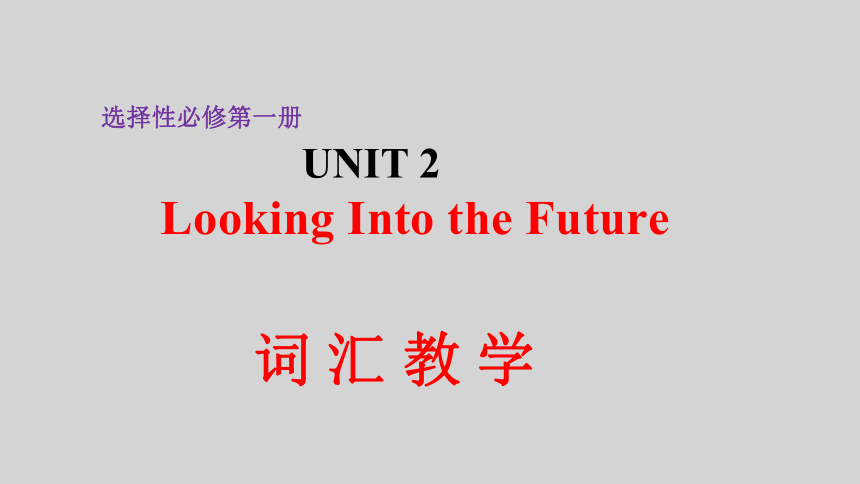
|
|
| 格式 | pptx | ||
| 文件大小 | 2.2MB | ||
| 资源类型 | 教案 | ||
| 版本资源 | 人教版(2019) | ||
| 科目 | 英语 | ||
| 更新时间 | 2021-09-24 00:00:00 | ||
图片预览


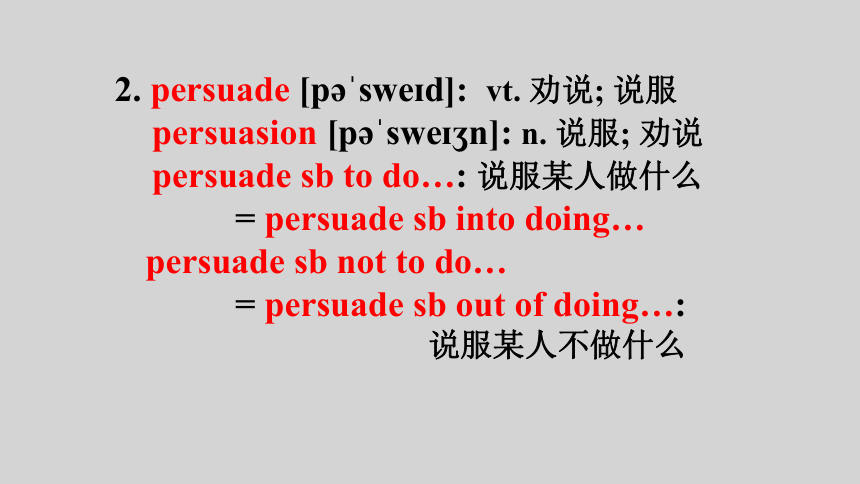
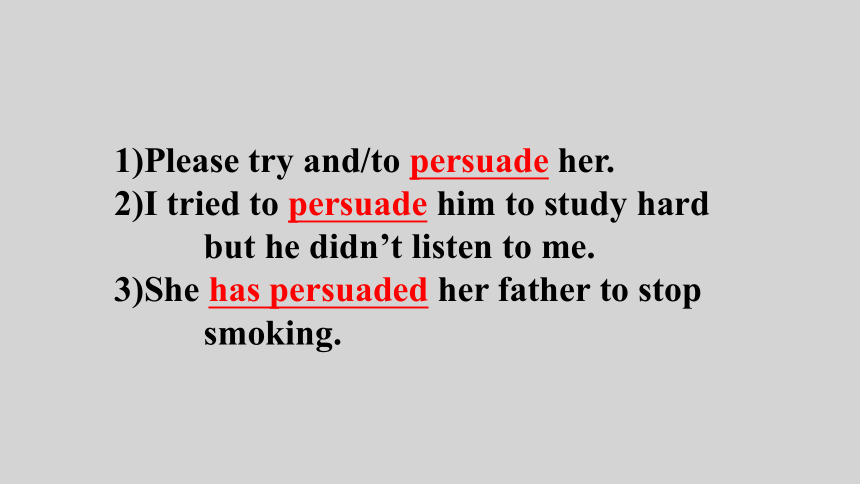
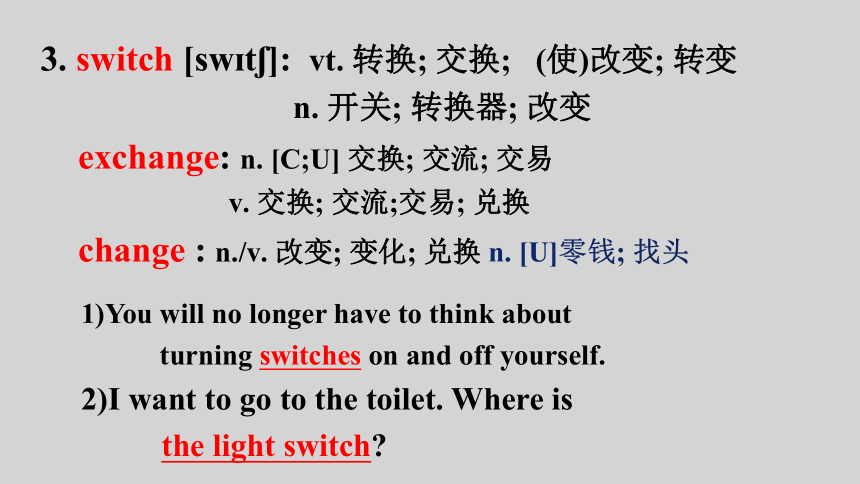
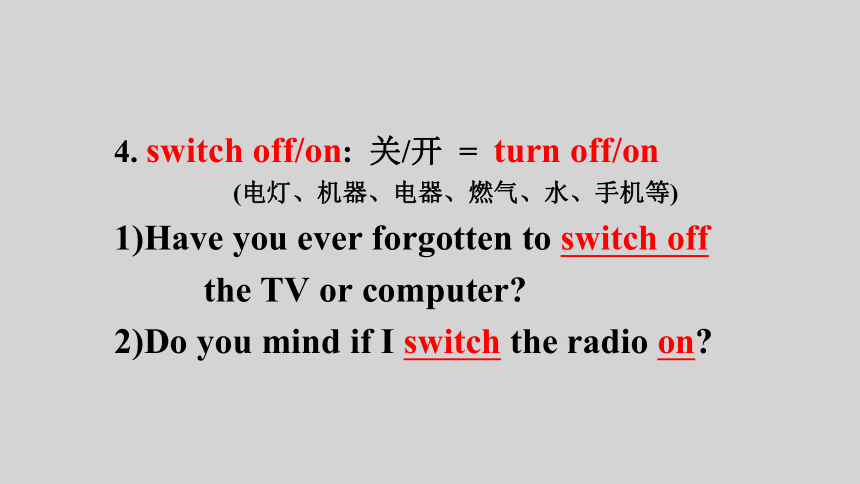
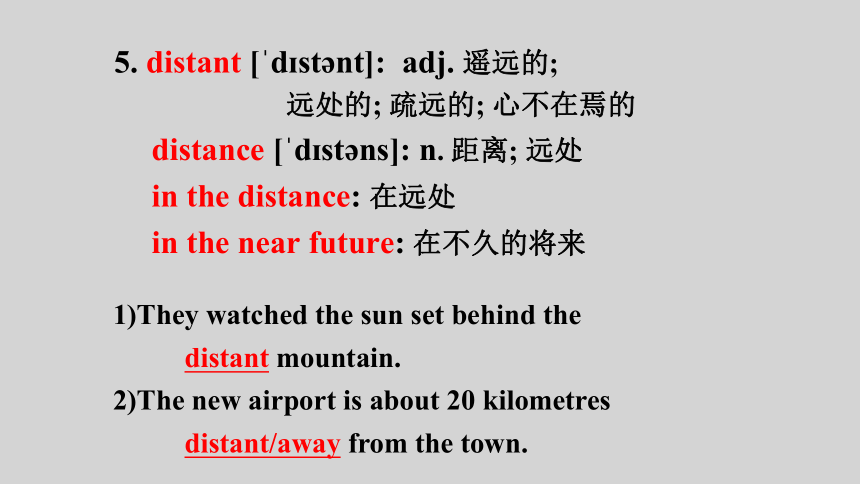
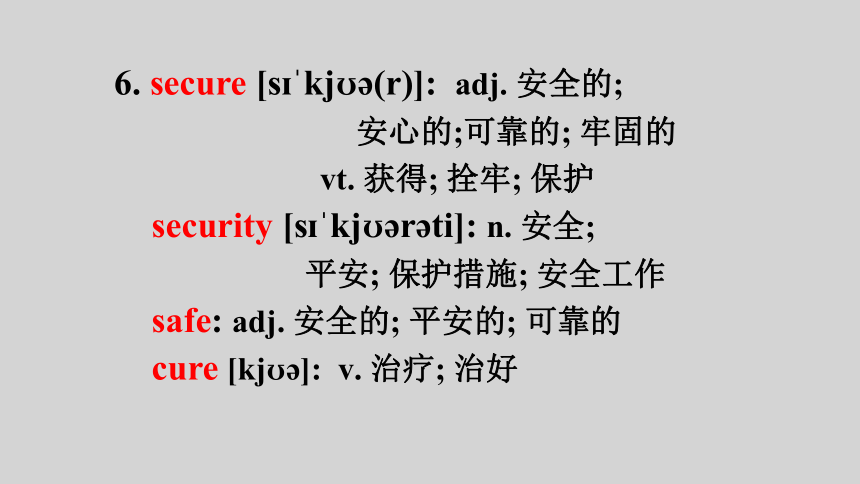
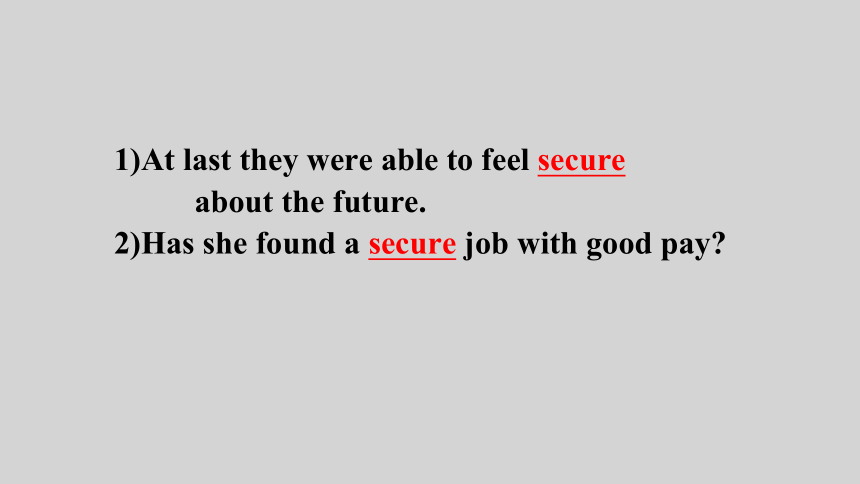
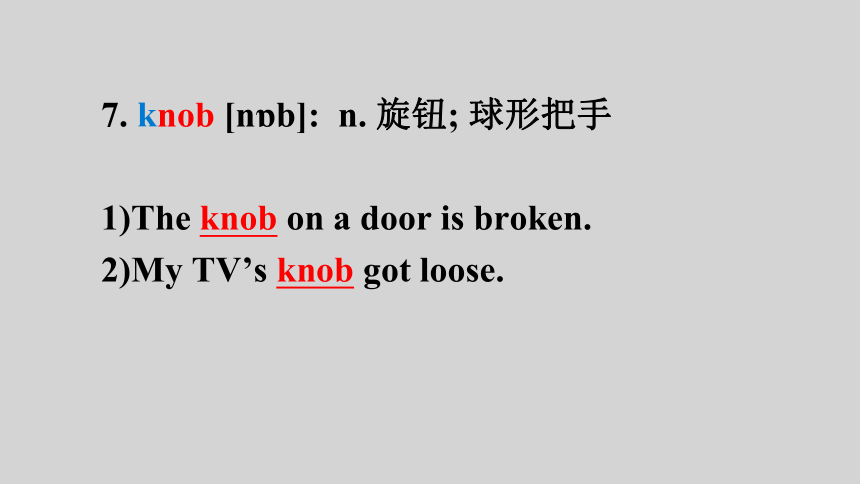
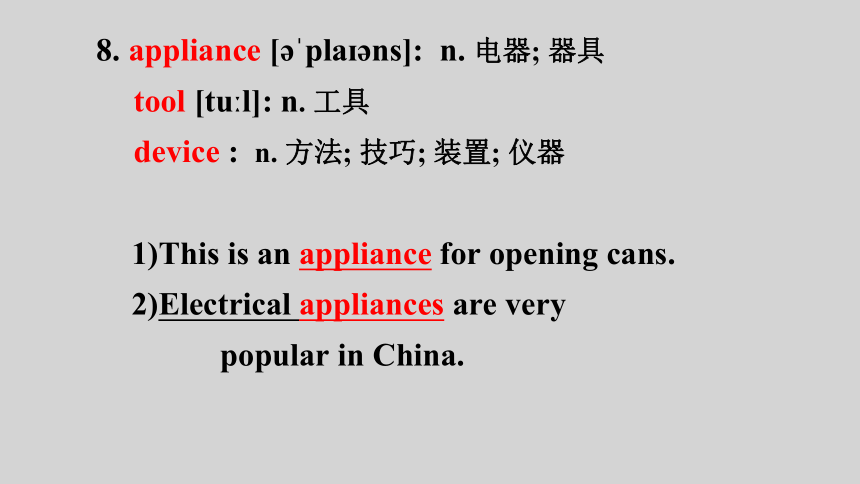
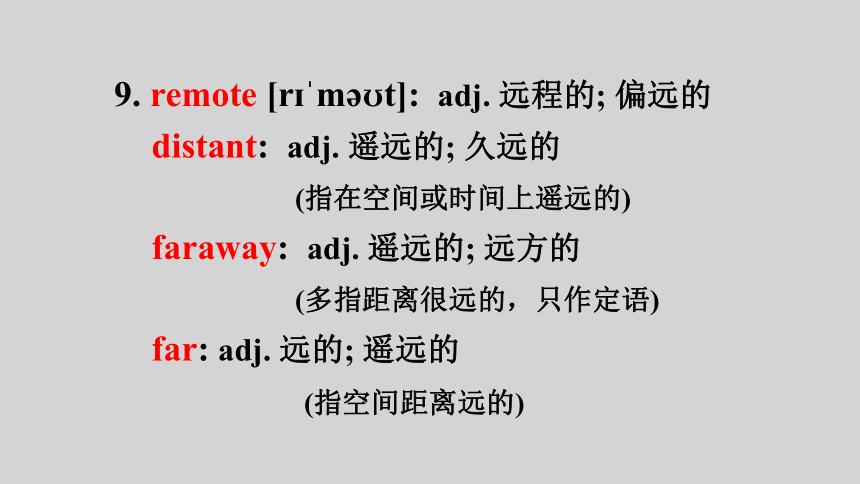
文档简介
(共88张PPT)
选择性必修第一册
UNIT
2
Looking
Into
the
Future
词
汇
教
学
1.phrase
[fre?z]:
n.
短语;
词组
expression
:
n.
词语;
表达法;
表达;
表情
word:
n.
单词;
话语
vocabulary
[v??k?bj?l?r?]:
n.
词汇;
词汇量
1)I
bought
an
English
phrase
book.
2)Do
you
know
the
meaning
of
the
phrase
“go
bananas”
?
2.
persuade
[p??swe?d]:
vt.
劝说;
说服
persuasion
[p??swe??n]:
n.
说服;
劝说
persuade
sb
to
do…:
说服某人做什么
=
persuade
sb
into
doing…
persuade
sb
not
to
do…
=
persuade
sb
out
of
doing…:
说服某人不做什么
1)Please
try
and/to
persuade
her.
2)I
tried
to
persuade
him
to
study
hard
but
he
didn’t
listen
to
me.
3)She
has
persuaded
her
father
to
stop
smoking.
3.
switch
[sw?t?]:
vt.
转换;
交换;
(使)改变;
转变
n.
开关;
转换器;
改变
exchange:
n.
[C;U]
交换;
交流;
交易
v.
交换;
交流;交易;
兑换
change
:
n./v.
改变;
变化;
兑换
n.
[U]零钱;
找头
1)You
will
no
longer
have
to
think
about
turning
switches
on
and
off
yourself.
2)I
want
to
go
to
the
toilet.
Where
is
the
light
switch?
4.
switch
off/on:
关/开
=
turn
off/on
(电灯、机器、电器、燃气、水、手机等)
1)Have
you
ever
forgotten
to
switch
off
the
TV
or
computer?
2)Do
you
mind
if
I
switch
the
radio
on?
5.
distant
[?d?st?nt]:
adj.
遥远的;
远处的;
疏远的;
心不在焉的
distance
[?d?st?ns]:
n.
距离;
远处
in
the
distance:
在远处
in
the
near
future:
在不久的将来
1)They
watched
the
sun
set
behind
the
distant
mountain.
2)The
new
airport
is
about
20
kilometres
distant/away
from
the
town.
6.
secure
[s??kj??(r)]:
adj.
安全的;
安心的;可靠的;
牢固的
vt.
获得;
拴牢;
保护
security
[s??kj??r?ti]:
n.
安全;
平安;
保护措施;
安全工作
safe:
adj.
安全的;
平安的;
可靠的
cure
[kj??]:
v.
治疗;
治好
1)At
last
they
were
able
to
feel
secure
about
the
future.
2)Has
she
found
a
secure
job
with
good
pay?
7.
knob
[n?b]:
n.
旋钮;
球形把手
1)The
knob
on
a
door
is
broken.
2)My
TV’s
knob
got
loose.
8.
appliance
[??pla??ns]:
n.
电器;
器具
tool
[tu?l]:
n.
工具
device
:
n.
方法;
技巧;
装置;
仪器
1)This
is
an
appliance
for
opening
cans.
2)Electrical
appliances
are
very
popular
in
China.
9.
remote
[r??m??t]:
adj.
远程的;
偏远的
distant:
adj.
遥远的;
久远的
(指在空间或时间上遥远的)
faraway:
adj.
遥远的;
远方的
(多指距离很远的,只作定语)
far:
adj.
远的;
遥远的
(指空间距离远的)
be
far
from...:
距…远
be
near
to…:
距…近
in
the
remote
past/future
:
在遥远的过去/将来
1)The
people
live
in
a
remote
village.
2)I
don’t
know
how
to
connect
a
remote
database.
10.
remote
control:
遥控器;
遥控
1)I
can’t
find
the
remote
control.
2)He
got
the
remote
control
and
pressed
the
‘play’
button.
11.
air
conditioner:
空调机;
空调设备
1)It
is
too
hot.
Would
you
mind
turning
on
the
air
conditioner?
12.
automatic
[???t??m?t?k]:
adj.
自动的
automatically:
adv.
自动地
1)
A
fully
automatic
driverless
car
is
being
tested
on
the
road.
2)Modern
trains
have
automatic
doors.
13.
integrated
[??nt?ɡre?t?d]:
adj.
各部分密切协调的;
综合的
1)The
department
focuses
on
integrated
designs.
14.
integrate
[??nt?gre?t]:
vi./vt.
(使)合并;
成为一体
combine
[k?m?ba?n]:
v.
联合;
合并
combine…
and/with…:
把…与…合并
1)These
programs
can
be
integrated
with
your
existing
software.
2)The
two
schools
were
integrated
in
2005.
15.
sensor
[?sens?(r)]:
n.
传感器;
敏感元件
1)We’
re
going
to
use
the
money
to
develop
a
smaller
and
lighter
sensor.
sense
[sens]
n.
感觉;
感觉官能(即视、听、嗅、味、触五觉)
16.
efficient
[??f??nt]:
adj.
效率高的;
有功效的
efficiently:
adv.
有效地;
效率高地
effective
[??fekt?v]:
adj.
有效的
1)She
is
really
a
very
efficient
person.
2)We
must
make
the
most
efficient
use
of
the
money.
17.
mode
[m??d]:
n.
模式;
方式;
风格
style
[sta?l]:
n.
风格;
方式;
特点;
作风
method
/approach
/manner/
means
/mode/
way
:
方法;
方式
1)Switch
the
camera
into
the
automatic
mode.
2)He
drew
sunflowers
in
a
very
different
mode/way.
18.
routine
[ru??ti?n]:
n.
常规;
正常顺序
adj.
常规的;
日常的
1)Her
disease
was
discovered
during
a
routine
medical
test.
19.
daily
routine:
日常生活
1)Exercise
has
become
part
of
my
daily
routine.
20.
preference
[?prefr?ns]:
n.
爱好;
偏爱
prefer
(-rred/-rring)
[pr??f??]:
v.
宁愿;
更喜欢
prefer
doing
A
to
doing
B:
喜欢做A事胜过做B事
have
a
preference
for...:
喜欢
1)Your
home
will
also
learn
your
daily
routine
and
preferences,
so
everything
will
be
ready
for
you
when
you
get
home
each
evening.
2)I
prefer
reading
a
newspaper
to
watching
TV.
比起看电视,我宁愿读报纸。
21.
instant
[??nst?nt]:
n.
瞬间;
片刻
adj.
立即的;
速食的;
速溶的
instantly:
adv.
立刻;
马上
immediately:
adv.
立刻;
马上
at
once
:
立刻;
马上
right
away:
立刻;
马上
1)
Don’t
expect
an
instant
success.
22.
command
[k??mɑ?nd]:
vt.
命令;
控制
n.
指令;
命令;
控制
control
:
v./n.
控制;
统治;
指挥;
支配
under
one’s
command:
由...控制/指挥/管辖
1)The
headmaster
has
400
teachers
under
his
command.
desire,
suggest,
propose,
recommend,
order/instruct/command,
demand,
request,
require,
ask,
urge(强烈要求),
insist(坚决要求),
等接that宾语从句时,从句
用
should
do/be
结构,
should可省。
23.
obey
[??be?]:
vi./vt.
服从;
遵守
obey
sb/sth:
服从/遵守...
obey
a
command/an
order
:
服从指挥/命令
obey
the
rule/law
:
遵守规章/法律
1)You
must
obey
the
captain’s
commands.
2)She
always
obeys
her
parents
without
question.
24.
warning
[?w??n??]:
n.
警告;
警示;
先兆
warn:
v.
警告;
告戒;
提醒注意
1)If
you
start
to
have
sleep
or
weight
problems,
it
will
send
a
warning
to
your
phone.
2)His
warning
was
still
ringing
in
my
ears.
3)People
are
swimming
in
the
ocean
despite
the
hurricane
warning.
25.
constant
[?k?nst?nt]:
n.
常数;
常量
adj.
不断的;
重复的;
不变的
constantly:
adv.
始终;
一直;
重复不断地
1)Smart
toilets
will
be
keeping
constant
track
of
your
health
as
well.
2)She
lives
in
constant
fear
of
losing
her
job.
3)He
drives
his
car
at
a
constant
speed
of
60
kilometres
per
hour.
4)Get
that
number
and
you
have
the
constant.
得到该数值后,便可作为常量。
26.
early
on:
在初期;
早先
1)I
knew
quite
early
on
that
I
would
marry
her.
2)
Share(股票)
prices
fell
early
on
but
rose
again
late
in
the
day.
27.
abnormal
[?b?n??ml]:
adj.
不正常的;
反常的
normal
[?n??ml]:
n.
常态;
正常
adj.
正常的;
平常的
【in-
im-
un-
dis-
-less
il-
ab-】
1)They
thought
her
behaviour
was
abnormal.
2)The
boy
is
abnormal
today.
28.
critical
[?kr?t?kl]:
adj.
严重的;
关键的;
批判性的
crucial
[?kru??l]:
adj.
至关重要的;
关键性的
criticize ['kr?t?sa?z]
v.
批评;挑剔
1)The
first
24
hours
after
the
operation
are
the
most
critical.
2)He
made
a
critical
speech
against
the
plan.
29.
cancer
[?k?ns?(r)]:
n.
癌;
癌症;
毒瘤
1)He
got
cancer
in
2017
and
died
last
year.
2)The
scientist
struggled
against
cancer
for
five
years.
30.
potentially
[p?'ten??li]:
adv.
潜在地;
可能地
【maybe/perhaps/possibly/likely/probably】
1)
Clearly
this
is
a
potentially
dangerous
situation.
31.
potential
[p?'ten??l]:
adj.
可能的;
潜在的
n.
潜力;
可能性
have
the
potential
to
do...:
有潜力做什么
possibility:
n.
可能性
chance
:
n.
可能性;
机会
1)Many
American
politicians
think
China
is
their
potential
enemy.
2)We
should
try
to
help
all
students
realize
their
full
potential.
3)He
has
the
potential
to
become
a
world-class
musician.
32.
leak
[li?k]:
vi./vt.
漏;
渗漏;
透露
n.
漏洞;
裂缝;
透露
crack:
n.
裂纹;
裂缝
1)The
pipe
has
leaked
a
lot
of
water.
33.
electrical
[??lektr?kl]:
adj.
电的;
用电的
electricity
[?,lek?tr?s?t?]:
n.
电
1)Electrical
appliances
are
very
popular
in
the
countryside
now.
2)He
is
our
electrical
engineer.
34.
wiring
[?wa??r??]:
n.
电线线路;
线路系统
The
wiring
in
your
house
should
be
renewed(更换)
every
ten
to
fifteen
years.
35.
wire
[?wa??]:
n.
电线;
金属丝/线
v.
接通电源;
将…连接到
wire
...
(up)
to...:
将…连接到...
1)Don’t
touch
that
wire
or
you
will
get
a
shock.
36.
detect
[d??tekt]:
vt.
发现;
查明
1)The
tests
are
designed
to
detect
the
disease
early.
37.
relevant
[?rel?v?nt]:
adj.
有关的;
有意义的
meaningful:
adj.
意义明显的
1)
Do
you
have
the
relevant
work
experience?
2)
His
words
are
still
relevant
today.
38.
catch
fire:
着火(动作)
be
on
fire:
着火(状态)
set
…
on
fire:
放火烧;
使…着火
set
fire
to...:
放火烧
1)This
way,
you
will
be
able
to
fix
the
problem
before
your
home
becomes
flooded
or
catches
fire.
2)Things
in
this
room
catch
fire
easily.
39.
fantasy
[?f?nt?si]:
n.
幻想;
想象
1)This
smart
technology
is
not
a
fantasy.
2)She
has
fantasies
about
her
future.
40.
innovation
[??n??ve??n]:
n.
创新;
创造
1)In
modern
times
we
must
encourage
(technical)
innovation.
2)In
our
society
nothing
is
more
important
than
technical
innovation.
41.
available
[??ve?l?bl]:
adj.
可获得的;
可购得的;(人)有空的
1)The
information
is
available
on
the
Internet.
2)The
new
medicine
will
be
available
from
April.
42.
in
this
sense
(in…sense):
从这种(某种)意义上来讲
in
a
sense:
在某种意义上
in
no
sense:
决不
1)In
this
sense,
the
home
of
tomorrow
is
already
the
home
of
today.
43.
nevertheless
[?nev????les]:
adj.
尽管如此;
不过;
然而
1)Nevertheless,
it
will
take
some
years
before
most
new
homes
begin
to
use
this
new
technology.
2)The
boy
is
a
bit
naughty,
but
I
like
him
nevertheless.
44.
structure
[?str?kt??(r)]:
n.
结构;
体系;
系统安排;
精心组织
system:
n.
体系;
方法;
制度;
体制;
系统
1)Your
composition
needs
(a)
structure.
2)The
library
is
a
wooden
structure.
45.
security
[s??kj??r?ti]:
n.
保护措施;
安全工作
secure:
vt.
获得;
拴牢;
保护
adj.
安全的;
安心的;可靠的;
牢固的
1)We
carry
out
security
checks
at
all
the
airports
in
our
country.
2)These
bad
people
were
considered
to
be
a
risk
to
national
security.
46.
crime
[kra?m]:
n.
犯罪活动;
不法行为
law:
n.
法律;
法学;
法规;
定律
break
the
law:
犯法
legal:
adj.
合法的;
法律的
illegal
:
adj.
非法的
1)Our
country
spends
more
and
more
on
crime
prevention
every
year.
2)The
crime
rate
is
rising
in
that
city.
47.
combine
[k?m?ba?n]:
vt./vi.
(使)结合;
混合
combine…
and/with…:
把…与…合并
combination[?k?mb??ne??n]:
n.
联合体;
混合体;
结合;
联合;
混合
1)You
should
try
to
combine
exercise
with
a
healthy
diet.
2)Several
factors
have
combined
to
ruin
our
plans.
48.
nanobot
['n?n?ub?t]:
n.
纳米机器人
robot
[?r??b?t]:
n.
机器人
android
[??ndr??d]:
n.
人形机器人
49.
artificial
[?ɑ?t??f??l]:
adj.
人工的;
人造的;
假的
artificial
flower假花
artificial
leather/diamond/pearl
人造皮革/钻石/珠宝
50.
artificial
intelligence
(AI
):
人工智能
[?n?tel?d??ns]:
n.
智力;
才智;
智慧;
情报
51.
clone
[kl??n]:
n.
克隆动物(或植物)
vt.
克隆;
以无性繁殖技术复制
1)Dolly
the
sheep
was
the
first
cloned
animal
in
the
world.
2)They
were
the
first
to
clone
a
sheep
from
adult
cells.
52.
predict
[pr??d?kt]:
vt.
预测;
预言;
预料
1)It
is
impossible
to
predict
what
will
happen
in
10,000
years.
53.
prediction
[pr??d?k?n]:
n.
预测;
预言;
预告
1)Many
people
don’t
agree
with
the
government’s
prediction
that
the
economy
will
improve
next
year.
54.
forecast
(forecast
/forecasted)
[?f??kɑ?st]:
vt./n.
预测;
预报
weather
forecast:
天气预报
1)The
weather
forecast
said
it
would
snow
hard
tomorrow.
2)The
report
forecasts
that
prices
will
rise
by
4%
next
year.
55.
occupation
[??kju?pe??n]:
n.
职业;
占领
occupy
[??kj?pa?]:
v.
占领;
占据;
担任
occupation:
(泛指任何一种工作,
通常不用来谈论
自己的职业,
多用于表格填写或正式书面语中)
profession
[pr??fe?n]:
n.
职业;
行业
(指需要经过专业培训的职业,
尤指需要较高
的受教育水平的职业)
career
[k??r??(r)]:
n.
职业;
事业
(指从事的职业或希望毕生从事的事业)
1)Please
write
down
your
name,
age,
and
occupation.
2)I
am
going
to
look
for
an
occupation
which
will
bring
me
lots
of
money.
56.
oppose
[??p??z]:
vt.
反对;
抵制;
阻挠
oppose
doing…:
反对做…
be
opposed
to
名词/doing…:
反对(做)…
1)I
will
oppose
changing
the
law.
2)The
president
threw
all
those
people
that
opposed
him
into
prison.
57.
hence
[hens]:
adv.
因此;
由此(正式用词)
therefore
:
adv.
因此;
所以
thus:
adv.
因此;
所以(与
therefore
基本同义。
正式,多用于书面语中)
so:
conj.
因此;
所以
1)Hence,
I
decided
to
help
my
father
to
give
up
smoking.
2)Hence,
the
final
exam
is
of
great
importance
to
all
the
students.
3)Mary
studied
hard;
thus/therefore/
hence
she
made
rapid
progress.
Mary
studied
hard,
and
thus/therefore/
hence
she
made
rapid
progress.
Mary
studied
hard.
Thus/Therefore/Hence
she
made
rapid
progress.
Mary
studied
hard
(,)
so
she
made
rapid
progress.
58.
cease
[si?s]:
vi./vt.
(使)停止;
终止
(正式用词)
cease
doing...:
停止做什么
cease
to
do...:
停止做什么
stop
doing…:
停止做...
stop
to
do…:
停下来做...
1)We
will
cease
to
work
with
the
woman
tomorrow.
2)At
seven
o’clock
the
rain
ceased/stopped.
59.
deceased
[d??si?st]:
adj.
已死的;
亡故的
(正式用词)
dead:
adj.
死的;
去世的
(普通用词)
1)The
deceased
left
a
large
sum
of
money
to
his
wife.
2)I
will
remember
my
deceased
parents
for
ever.
3)Her
dogs
are
all
deceased/dead.
60.
absence
[??bs?ns]:
n.
不存在;
缺乏;
缺席
during
one’s
absence:
某人不在期间
absent
[??bs?nt]
:
adj.
缺席;
缺少;
无
be
absent
from…:
缺席...
1)We
did
not
receive
any
news
during
his
long
absence.
2)The
boss
isn’t
happy
about
his
absence.
61.
rural
[?r??r?l]:
adj.
乡村的;
农村的
urban:
adj.
城市的;
城镇的
country
:
n.
国家;
农村
countryside
:
n.
农村
city:
n.
大城市
town:
n.
城镇
62.
advocate
[??dv?ke?t]:
v.
提倡;
支持;
拥护
n.
提倡者;
支持者;
拥护者
advocate
doing...:
提倡/支持/拥护做什么
1)We
do
not
advocate
the
use
of
violence(暴力).
2)Many
teachers
advocate
praising
your
child
for
his
good
behaviour.
63.
emphasis
[?emf?s?s]:
n.
强调;
重视;
重要性
(复数:
emphases)
emphasize/emphasise
[?emf?sa?z]:
v.
强调;
重视
1)They
advocate
a
simple
life
with
an
emphasis
on
hard
work,
family,
and
community.
2)Our
factory
puts
emphasis
on
quality.
64.
luxury
[?l?k??ri]:
n.
奢华
luxury
hotel/goods:
豪华宾馆/奢侈品
1)It
was
a
luxury
if
you
had
a
colour
TV
set
in
those
days.
3)We
don’t
want
to
lead
a
life
of
luxury.
65.
keep
in
touch
(with...):
(与…)保持联系;了解(某课题或领域的情况)
keep/stay/be
in
touch
with…:
与…保持联系
lose
touch
with…:
与…失去联系
1)It
is
important
for
us
to
keep
in
touch
with
the
latest
technologies.
66.
career
[k??r??(r)]:
n.
职业;
事业
1)I
found
my
career
as
an
AI
designer
through
a
social
media
network.
67.
prospect
[?pr?spekt]:
n.
可能性;
前景
possibility:n.
可能性
chance:n.
机会;
可能性
1)Of
course,
when
new
technology
changes
the
way
we
live,
it
can
be
a
scary
prospect.
2)There’s
a
reasonable
prospect
that
they
will
buy
a
car.
68.
resist
[r??z?st]:
v.
抵制;
反抗;
抵挡
resist
doing...:
反对/忍住做什么
1)They
are
determined
to
resist
pressure
to
change
the
law.
2)He
could
not
resist
telling
her
the
truth
.
69.
resistance
[r??z?st?ns]:
n.
抵制;
反对;
抗拒
1)There
has
been
a
lot
of
resistance
to
this
new
rules.
2)The
troops
are
encountering
plenty
of
resistance.
70.
paragraph
[?p?r?ɡrɑ?f]:
n.
段;
段落
passage
[?p?s?d?]:
n.
段落,文段
1)The
first
paragraph
of
his
paper
was
about
the
history
of
China.
71.
signpost
[?sa?np??st]:
n.
路标
1)There
is
a
signpost
where
the
two
roads
meet.
72.
essay
[?ese?
]:
n.
文章
article
[?ɑ?t?kl]:
n.
文章;
论文;
冠词
composition
[,k?mp??z??n]:
n.
作文;
成分;
结构
1)This
is
an
essay
on
the
causes
of
the
First
World
War.
73.
accurate
[??kj?r?t]:
adj.
精确的;
准确的
accurately:
adv.
准确地;
正确地
1)Our
clock
is
not
very
accurate.
2)They
haven’t
given
us
accurateinformation.
74.
librarian
[la??bre?ri?n]:
n.
图书管理员;
图书馆馆长
library
[?la?br?r?]:
n.
图书馆/室
musician:
n.
音乐家
physician:
n.
医师;
(尤指)内科医生
historian:
n.
历史学家
Egyptian:
n.
埃及人
1)The
librarian
said
that
I
might
have
that
book
for
three
weeks.
2)She
wants
the
librarian
to
show
her
how
to
use
the
library.
75.
Melbourne
['melb?n]:
墨尔本(澳大利亚城市)
76.
Christian
[?kr?st??n]:
n.
基督教徒
adj.
基督教的
1)Most
of
my
friends
are
Christian/
Christians.
2)At
this
time
she
decided
to
become
a
Christian.
77.
the
Amish
['ɑ?m??]:
n.
阿曼门诺派
Probably
the
most
well
known
are
the
Amish,
a
group
of
Christians
living
in
rural
America.
阿曼门诺派由欧洲门诺派长老阿曼在17世纪时创立,其成员主要是老派阿曼门诺派的信徒。其早期活动范围在瑞
士、荷兰、德国、阿尔萨斯、俄国等地,
后受到门诺派的压迫,
大部分信徒于19、20世纪先后迁居北美。他们中许多人现在仍保持着阿曼派独特的生活作风,
他们以衣着一致和自给自足的农耕生活方式闻名。其特点是:
维系原初生活状况,
与现代社会保持距离;
坚持生活在其定居点之
内,从事农耕却不使用现代农业机械;
不用汽车等现代交通工具而选用马及马车;他们生活简朴,禁用电灯、电话;儿童教育限于小学程度,
有些信徒宁肯触犯当地义务教育法而入狱受罚也不许子女上中学。
Thank
you!
选择性必修第一册
UNIT
2
Looking
Into
the
Future
词
汇
教
学
1.phrase
[fre?z]:
n.
短语;
词组
expression
:
n.
词语;
表达法;
表达;
表情
word:
n.
单词;
话语
vocabulary
[v??k?bj?l?r?]:
n.
词汇;
词汇量
1)I
bought
an
English
phrase
book.
2)Do
you
know
the
meaning
of
the
phrase
“go
bananas”
?
2.
persuade
[p??swe?d]:
vt.
劝说;
说服
persuasion
[p??swe??n]:
n.
说服;
劝说
persuade
sb
to
do…:
说服某人做什么
=
persuade
sb
into
doing…
persuade
sb
not
to
do…
=
persuade
sb
out
of
doing…:
说服某人不做什么
1)Please
try
and/to
persuade
her.
2)I
tried
to
persuade
him
to
study
hard
but
he
didn’t
listen
to
me.
3)She
has
persuaded
her
father
to
stop
smoking.
3.
switch
[sw?t?]:
vt.
转换;
交换;
(使)改变;
转变
n.
开关;
转换器;
改变
exchange:
n.
[C;U]
交换;
交流;
交易
v.
交换;
交流;交易;
兑换
change
:
n./v.
改变;
变化;
兑换
n.
[U]零钱;
找头
1)You
will
no
longer
have
to
think
about
turning
switches
on
and
off
yourself.
2)I
want
to
go
to
the
toilet.
Where
is
the
light
switch?
4.
switch
off/on:
关/开
=
turn
off/on
(电灯、机器、电器、燃气、水、手机等)
1)Have
you
ever
forgotten
to
switch
off
the
TV
or
computer?
2)Do
you
mind
if
I
switch
the
radio
on?
5.
distant
[?d?st?nt]:
adj.
遥远的;
远处的;
疏远的;
心不在焉的
distance
[?d?st?ns]:
n.
距离;
远处
in
the
distance:
在远处
in
the
near
future:
在不久的将来
1)They
watched
the
sun
set
behind
the
distant
mountain.
2)The
new
airport
is
about
20
kilometres
distant/away
from
the
town.
6.
secure
[s??kj??(r)]:
adj.
安全的;
安心的;可靠的;
牢固的
vt.
获得;
拴牢;
保护
security
[s??kj??r?ti]:
n.
安全;
平安;
保护措施;
安全工作
safe:
adj.
安全的;
平安的;
可靠的
cure
[kj??]:
v.
治疗;
治好
1)At
last
they
were
able
to
feel
secure
about
the
future.
2)Has
she
found
a
secure
job
with
good
pay?
7.
knob
[n?b]:
n.
旋钮;
球形把手
1)The
knob
on
a
door
is
broken.
2)My
TV’s
knob
got
loose.
8.
appliance
[??pla??ns]:
n.
电器;
器具
tool
[tu?l]:
n.
工具
device
:
n.
方法;
技巧;
装置;
仪器
1)This
is
an
appliance
for
opening
cans.
2)Electrical
appliances
are
very
popular
in
China.
9.
remote
[r??m??t]:
adj.
远程的;
偏远的
distant:
adj.
遥远的;
久远的
(指在空间或时间上遥远的)
faraway:
adj.
遥远的;
远方的
(多指距离很远的,只作定语)
far:
adj.
远的;
遥远的
(指空间距离远的)
be
far
from...:
距…远
be
near
to…:
距…近
in
the
remote
past/future
:
在遥远的过去/将来
1)The
people
live
in
a
remote
village.
2)I
don’t
know
how
to
connect
a
remote
database.
10.
remote
control:
遥控器;
遥控
1)I
can’t
find
the
remote
control.
2)He
got
the
remote
control
and
pressed
the
‘play’
button.
11.
air
conditioner:
空调机;
空调设备
1)It
is
too
hot.
Would
you
mind
turning
on
the
air
conditioner?
12.
automatic
[???t??m?t?k]:
adj.
自动的
automatically:
adv.
自动地
1)
A
fully
automatic
driverless
car
is
being
tested
on
the
road.
2)Modern
trains
have
automatic
doors.
13.
integrated
[??nt?ɡre?t?d]:
adj.
各部分密切协调的;
综合的
1)The
department
focuses
on
integrated
designs.
14.
integrate
[??nt?gre?t]:
vi./vt.
(使)合并;
成为一体
combine
[k?m?ba?n]:
v.
联合;
合并
combine…
and/with…:
把…与…合并
1)These
programs
can
be
integrated
with
your
existing
software.
2)The
two
schools
were
integrated
in
2005.
15.
sensor
[?sens?(r)]:
n.
传感器;
敏感元件
1)We’
re
going
to
use
the
money
to
develop
a
smaller
and
lighter
sensor.
sense
[sens]
n.
感觉;
感觉官能(即视、听、嗅、味、触五觉)
16.
efficient
[??f??nt]:
adj.
效率高的;
有功效的
efficiently:
adv.
有效地;
效率高地
effective
[??fekt?v]:
adj.
有效的
1)She
is
really
a
very
efficient
person.
2)We
must
make
the
most
efficient
use
of
the
money.
17.
mode
[m??d]:
n.
模式;
方式;
风格
style
[sta?l]:
n.
风格;
方式;
特点;
作风
method
/approach
/manner/
means
/mode/
way
:
方法;
方式
1)Switch
the
camera
into
the
automatic
mode.
2)He
drew
sunflowers
in
a
very
different
mode/way.
18.
routine
[ru??ti?n]:
n.
常规;
正常顺序
adj.
常规的;
日常的
1)Her
disease
was
discovered
during
a
routine
medical
test.
19.
daily
routine:
日常生活
1)Exercise
has
become
part
of
my
daily
routine.
20.
preference
[?prefr?ns]:
n.
爱好;
偏爱
prefer
(-rred/-rring)
[pr??f??]:
v.
宁愿;
更喜欢
prefer
doing
A
to
doing
B:
喜欢做A事胜过做B事
have
a
preference
for...:
喜欢
1)Your
home
will
also
learn
your
daily
routine
and
preferences,
so
everything
will
be
ready
for
you
when
you
get
home
each
evening.
2)I
prefer
reading
a
newspaper
to
watching
TV.
比起看电视,我宁愿读报纸。
21.
instant
[??nst?nt]:
n.
瞬间;
片刻
adj.
立即的;
速食的;
速溶的
instantly:
adv.
立刻;
马上
immediately:
adv.
立刻;
马上
at
once
:
立刻;
马上
right
away:
立刻;
马上
1)
Don’t
expect
an
instant
success.
22.
command
[k??mɑ?nd]:
vt.
命令;
控制
n.
指令;
命令;
控制
control
:
v./n.
控制;
统治;
指挥;
支配
under
one’s
command:
由...控制/指挥/管辖
1)The
headmaster
has
400
teachers
under
his
command.
desire,
suggest,
propose,
recommend,
order/instruct/command,
demand,
request,
require,
ask,
urge(强烈要求),
insist(坚决要求),
等接that宾语从句时,从句
用
should
do/be
结构,
should可省。
23.
obey
[??be?]:
vi./vt.
服从;
遵守
obey
sb/sth:
服从/遵守...
obey
a
command/an
order
:
服从指挥/命令
obey
the
rule/law
:
遵守规章/法律
1)You
must
obey
the
captain’s
commands.
2)She
always
obeys
her
parents
without
question.
24.
warning
[?w??n??]:
n.
警告;
警示;
先兆
warn:
v.
警告;
告戒;
提醒注意
1)If
you
start
to
have
sleep
or
weight
problems,
it
will
send
a
warning
to
your
phone.
2)His
warning
was
still
ringing
in
my
ears.
3)People
are
swimming
in
the
ocean
despite
the
hurricane
warning.
25.
constant
[?k?nst?nt]:
n.
常数;
常量
adj.
不断的;
重复的;
不变的
constantly:
adv.
始终;
一直;
重复不断地
1)Smart
toilets
will
be
keeping
constant
track
of
your
health
as
well.
2)She
lives
in
constant
fear
of
losing
her
job.
3)He
drives
his
car
at
a
constant
speed
of
60
kilometres
per
hour.
4)Get
that
number
and
you
have
the
constant.
得到该数值后,便可作为常量。
26.
early
on:
在初期;
早先
1)I
knew
quite
early
on
that
I
would
marry
her.
2)
Share(股票)
prices
fell
early
on
but
rose
again
late
in
the
day.
27.
abnormal
[?b?n??ml]:
adj.
不正常的;
反常的
normal
[?n??ml]:
n.
常态;
正常
adj.
正常的;
平常的
【in-
im-
un-
dis-
-less
il-
ab-】
1)They
thought
her
behaviour
was
abnormal.
2)The
boy
is
abnormal
today.
28.
critical
[?kr?t?kl]:
adj.
严重的;
关键的;
批判性的
crucial
[?kru??l]:
adj.
至关重要的;
关键性的
criticize ['kr?t?sa?z]
v.
批评;挑剔
1)The
first
24
hours
after
the
operation
are
the
most
critical.
2)He
made
a
critical
speech
against
the
plan.
29.
cancer
[?k?ns?(r)]:
n.
癌;
癌症;
毒瘤
1)He
got
cancer
in
2017
and
died
last
year.
2)The
scientist
struggled
against
cancer
for
five
years.
30.
potentially
[p?'ten??li]:
adv.
潜在地;
可能地
【maybe/perhaps/possibly/likely/probably】
1)
Clearly
this
is
a
potentially
dangerous
situation.
31.
potential
[p?'ten??l]:
adj.
可能的;
潜在的
n.
潜力;
可能性
have
the
potential
to
do...:
有潜力做什么
possibility:
n.
可能性
chance
:
n.
可能性;
机会
1)Many
American
politicians
think
China
is
their
potential
enemy.
2)We
should
try
to
help
all
students
realize
their
full
potential.
3)He
has
the
potential
to
become
a
world-class
musician.
32.
leak
[li?k]:
vi./vt.
漏;
渗漏;
透露
n.
漏洞;
裂缝;
透露
crack:
n.
裂纹;
裂缝
1)The
pipe
has
leaked
a
lot
of
water.
33.
electrical
[??lektr?kl]:
adj.
电的;
用电的
electricity
[?,lek?tr?s?t?]:
n.
电
1)Electrical
appliances
are
very
popular
in
the
countryside
now.
2)He
is
our
electrical
engineer.
34.
wiring
[?wa??r??]:
n.
电线线路;
线路系统
The
wiring
in
your
house
should
be
renewed(更换)
every
ten
to
fifteen
years.
35.
wire
[?wa??]:
n.
电线;
金属丝/线
v.
接通电源;
将…连接到
wire
...
(up)
to...:
将…连接到...
1)Don’t
touch
that
wire
or
you
will
get
a
shock.
36.
detect
[d??tekt]:
vt.
发现;
查明
1)The
tests
are
designed
to
detect
the
disease
early.
37.
relevant
[?rel?v?nt]:
adj.
有关的;
有意义的
meaningful:
adj.
意义明显的
1)
Do
you
have
the
relevant
work
experience?
2)
His
words
are
still
relevant
today.
38.
catch
fire:
着火(动作)
be
on
fire:
着火(状态)
set
…
on
fire:
放火烧;
使…着火
set
fire
to...:
放火烧
1)This
way,
you
will
be
able
to
fix
the
problem
before
your
home
becomes
flooded
or
catches
fire.
2)Things
in
this
room
catch
fire
easily.
39.
fantasy
[?f?nt?si]:
n.
幻想;
想象
1)This
smart
technology
is
not
a
fantasy.
2)She
has
fantasies
about
her
future.
40.
innovation
[??n??ve??n]:
n.
创新;
创造
1)In
modern
times
we
must
encourage
(technical)
innovation.
2)In
our
society
nothing
is
more
important
than
technical
innovation.
41.
available
[??ve?l?bl]:
adj.
可获得的;
可购得的;(人)有空的
1)The
information
is
available
on
the
Internet.
2)The
new
medicine
will
be
available
from
April.
42.
in
this
sense
(in…sense):
从这种(某种)意义上来讲
in
a
sense:
在某种意义上
in
no
sense:
决不
1)In
this
sense,
the
home
of
tomorrow
is
already
the
home
of
today.
43.
nevertheless
[?nev????les]:
adj.
尽管如此;
不过;
然而
1)Nevertheless,
it
will
take
some
years
before
most
new
homes
begin
to
use
this
new
technology.
2)The
boy
is
a
bit
naughty,
but
I
like
him
nevertheless.
44.
structure
[?str?kt??(r)]:
n.
结构;
体系;
系统安排;
精心组织
system:
n.
体系;
方法;
制度;
体制;
系统
1)Your
composition
needs
(a)
structure.
2)The
library
is
a
wooden
structure.
45.
security
[s??kj??r?ti]:
n.
保护措施;
安全工作
secure:
vt.
获得;
拴牢;
保护
adj.
安全的;
安心的;可靠的;
牢固的
1)We
carry
out
security
checks
at
all
the
airports
in
our
country.
2)These
bad
people
were
considered
to
be
a
risk
to
national
security.
46.
crime
[kra?m]:
n.
犯罪活动;
不法行为
law:
n.
法律;
法学;
法规;
定律
break
the
law:
犯法
legal:
adj.
合法的;
法律的
illegal
:
adj.
非法的
1)Our
country
spends
more
and
more
on
crime
prevention
every
year.
2)The
crime
rate
is
rising
in
that
city.
47.
combine
[k?m?ba?n]:
vt./vi.
(使)结合;
混合
combine…
and/with…:
把…与…合并
combination[?k?mb??ne??n]:
n.
联合体;
混合体;
结合;
联合;
混合
1)You
should
try
to
combine
exercise
with
a
healthy
diet.
2)Several
factors
have
combined
to
ruin
our
plans.
48.
nanobot
['n?n?ub?t]:
n.
纳米机器人
robot
[?r??b?t]:
n.
机器人
android
[??ndr??d]:
n.
人形机器人
49.
artificial
[?ɑ?t??f??l]:
adj.
人工的;
人造的;
假的
artificial
flower假花
artificial
leather/diamond/pearl
人造皮革/钻石/珠宝
50.
artificial
intelligence
(AI
):
人工智能
[?n?tel?d??ns]:
n.
智力;
才智;
智慧;
情报
51.
clone
[kl??n]:
n.
克隆动物(或植物)
vt.
克隆;
以无性繁殖技术复制
1)Dolly
the
sheep
was
the
first
cloned
animal
in
the
world.
2)They
were
the
first
to
clone
a
sheep
from
adult
cells.
52.
predict
[pr??d?kt]:
vt.
预测;
预言;
预料
1)It
is
impossible
to
predict
what
will
happen
in
10,000
years.
53.
prediction
[pr??d?k?n]:
n.
预测;
预言;
预告
1)Many
people
don’t
agree
with
the
government’s
prediction
that
the
economy
will
improve
next
year.
54.
forecast
(forecast
/forecasted)
[?f??kɑ?st]:
vt./n.
预测;
预报
weather
forecast:
天气预报
1)The
weather
forecast
said
it
would
snow
hard
tomorrow.
2)The
report
forecasts
that
prices
will
rise
by
4%
next
year.
55.
occupation
[??kju?pe??n]:
n.
职业;
占领
occupy
[??kj?pa?]:
v.
占领;
占据;
担任
occupation:
(泛指任何一种工作,
通常不用来谈论
自己的职业,
多用于表格填写或正式书面语中)
profession
[pr??fe?n]:
n.
职业;
行业
(指需要经过专业培训的职业,
尤指需要较高
的受教育水平的职业)
career
[k??r??(r)]:
n.
职业;
事业
(指从事的职业或希望毕生从事的事业)
1)Please
write
down
your
name,
age,
and
occupation.
2)I
am
going
to
look
for
an
occupation
which
will
bring
me
lots
of
money.
56.
oppose
[??p??z]:
vt.
反对;
抵制;
阻挠
oppose
doing…:
反对做…
be
opposed
to
名词/doing…:
反对(做)…
1)I
will
oppose
changing
the
law.
2)The
president
threw
all
those
people
that
opposed
him
into
prison.
57.
hence
[hens]:
adv.
因此;
由此(正式用词)
therefore
:
adv.
因此;
所以
thus:
adv.
因此;
所以(与
therefore
基本同义。
正式,多用于书面语中)
so:
conj.
因此;
所以
1)Hence,
I
decided
to
help
my
father
to
give
up
smoking.
2)Hence,
the
final
exam
is
of
great
importance
to
all
the
students.
3)Mary
studied
hard;
thus/therefore/
hence
she
made
rapid
progress.
Mary
studied
hard,
and
thus/therefore/
hence
she
made
rapid
progress.
Mary
studied
hard.
Thus/Therefore/Hence
she
made
rapid
progress.
Mary
studied
hard
(,)
so
she
made
rapid
progress.
58.
cease
[si?s]:
vi./vt.
(使)停止;
终止
(正式用词)
cease
doing...:
停止做什么
cease
to
do...:
停止做什么
stop
doing…:
停止做...
stop
to
do…:
停下来做...
1)We
will
cease
to
work
with
the
woman
tomorrow.
2)At
seven
o’clock
the
rain
ceased/stopped.
59.
deceased
[d??si?st]:
adj.
已死的;
亡故的
(正式用词)
dead:
adj.
死的;
去世的
(普通用词)
1)The
deceased
left
a
large
sum
of
money
to
his
wife.
2)I
will
remember
my
deceased
parents
for
ever.
3)Her
dogs
are
all
deceased/dead.
60.
absence
[??bs?ns]:
n.
不存在;
缺乏;
缺席
during
one’s
absence:
某人不在期间
absent
[??bs?nt]
:
adj.
缺席;
缺少;
无
be
absent
from…:
缺席...
1)We
did
not
receive
any
news
during
his
long
absence.
2)The
boss
isn’t
happy
about
his
absence.
61.
rural
[?r??r?l]:
adj.
乡村的;
农村的
urban:
adj.
城市的;
城镇的
country
:
n.
国家;
农村
countryside
:
n.
农村
city:
n.
大城市
town:
n.
城镇
62.
advocate
[??dv?ke?t]:
v.
提倡;
支持;
拥护
n.
提倡者;
支持者;
拥护者
advocate
doing...:
提倡/支持/拥护做什么
1)We
do
not
advocate
the
use
of
violence(暴力).
2)Many
teachers
advocate
praising
your
child
for
his
good
behaviour.
63.
emphasis
[?emf?s?s]:
n.
强调;
重视;
重要性
(复数:
emphases)
emphasize/emphasise
[?emf?sa?z]:
v.
强调;
重视
1)They
advocate
a
simple
life
with
an
emphasis
on
hard
work,
family,
and
community.
2)Our
factory
puts
emphasis
on
quality.
64.
luxury
[?l?k??ri]:
n.
奢华
luxury
hotel/goods:
豪华宾馆/奢侈品
1)It
was
a
luxury
if
you
had
a
colour
TV
set
in
those
days.
3)We
don’t
want
to
lead
a
life
of
luxury.
65.
keep
in
touch
(with...):
(与…)保持联系;了解(某课题或领域的情况)
keep/stay/be
in
touch
with…:
与…保持联系
lose
touch
with…:
与…失去联系
1)It
is
important
for
us
to
keep
in
touch
with
the
latest
technologies.
66.
career
[k??r??(r)]:
n.
职业;
事业
1)I
found
my
career
as
an
AI
designer
through
a
social
media
network.
67.
prospect
[?pr?spekt]:
n.
可能性;
前景
possibility:n.
可能性
chance:n.
机会;
可能性
1)Of
course,
when
new
technology
changes
the
way
we
live,
it
can
be
a
scary
prospect.
2)There’s
a
reasonable
prospect
that
they
will
buy
a
car.
68.
resist
[r??z?st]:
v.
抵制;
反抗;
抵挡
resist
doing...:
反对/忍住做什么
1)They
are
determined
to
resist
pressure
to
change
the
law.
2)He
could
not
resist
telling
her
the
truth
.
69.
resistance
[r??z?st?ns]:
n.
抵制;
反对;
抗拒
1)There
has
been
a
lot
of
resistance
to
this
new
rules.
2)The
troops
are
encountering
plenty
of
resistance.
70.
paragraph
[?p?r?ɡrɑ?f]:
n.
段;
段落
passage
[?p?s?d?]:
n.
段落,文段
1)The
first
paragraph
of
his
paper
was
about
the
history
of
China.
71.
signpost
[?sa?np??st]:
n.
路标
1)There
is
a
signpost
where
the
two
roads
meet.
72.
essay
[?ese?
]:
n.
文章
article
[?ɑ?t?kl]:
n.
文章;
论文;
冠词
composition
[,k?mp??z??n]:
n.
作文;
成分;
结构
1)This
is
an
essay
on
the
causes
of
the
First
World
War.
73.
accurate
[??kj?r?t]:
adj.
精确的;
准确的
accurately:
adv.
准确地;
正确地
1)Our
clock
is
not
very
accurate.
2)They
haven’t
given
us
accurateinformation.
74.
librarian
[la??bre?ri?n]:
n.
图书管理员;
图书馆馆长
library
[?la?br?r?]:
n.
图书馆/室
musician:
n.
音乐家
physician:
n.
医师;
(尤指)内科医生
historian:
n.
历史学家
Egyptian:
n.
埃及人
1)The
librarian
said
that
I
might
have
that
book
for
three
weeks.
2)She
wants
the
librarian
to
show
her
how
to
use
the
library.
75.
Melbourne
['melb?n]:
墨尔本(澳大利亚城市)
76.
Christian
[?kr?st??n]:
n.
基督教徒
adj.
基督教的
1)Most
of
my
friends
are
Christian/
Christians.
2)At
this
time
she
decided
to
become
a
Christian.
77.
the
Amish
['ɑ?m??]:
n.
阿曼门诺派
Probably
the
most
well
known
are
the
Amish,
a
group
of
Christians
living
in
rural
America.
阿曼门诺派由欧洲门诺派长老阿曼在17世纪时创立,其成员主要是老派阿曼门诺派的信徒。其早期活动范围在瑞
士、荷兰、德国、阿尔萨斯、俄国等地,
后受到门诺派的压迫,
大部分信徒于19、20世纪先后迁居北美。他们中许多人现在仍保持着阿曼派独特的生活作风,
他们以衣着一致和自给自足的农耕生活方式闻名。其特点是:
维系原初生活状况,
与现代社会保持距离;
坚持生活在其定居点之
内,从事农耕却不使用现代农业机械;
不用汽车等现代交通工具而选用马及马车;他们生活简朴,禁用电灯、电话;儿童教育限于小学程度,
有些信徒宁肯触犯当地义务教育法而入狱受罚也不许子女上中学。
Thank
you!
